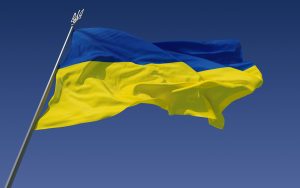
Almost all of us have been watching the war between Russia and Ukraine unfold in real time this week. Checking for updates on news sites, reading harrowing and heroic stories, perhaps checking in with friends and family in the affected areas via social media or email. Perhaps even seeking out books, movies, music, and other media from Ukraine and eastern Europe.
Associate Professor Andrea Bohlman, who has a research focus on music in eastern Europe, though not Ukraine specifically, has provided a helpful list of resources for individuals who want to take time to musically connect to the region. The struggle for sovereignty in Ukraine has a long and complex history, which is not always in the larger discussion of world politics, on the news, or in the classroom.
The musical resources below allow us to connect to this region and culture as we all attempt to process and discuss current events. “I would share three points of entry to places currently under attack,” Dr. Bohlman wrote on Sunday. “I have returned to these over and over the past days to make meaning and to feel a connection.”
- A Smithsonian Folkways album of choral music that amplifies the fieldwork of a Ukrainian ethnomusicologist, Yevhen Yefremov, in the Chernobyl region. It is available on Spotify and Apple Music, along with the UNC subscription to Alexander Street Music and Dance Online. It was produced by the ethnomusicologist Maria Sonevytsky (whose research is specifically on sound and Ukrainian sovereignty); I write about it in my chapter on Europe in Excursions in World Music, a textbook for undergraduates. Ensemble Hilka, Chornobyl Songs Project: Living Cultures from a Lost World.
- The music of the Kyiv-based polystylistic composer Valentin Silvestrov, who nurtures his Bandcamp page with recent compositions. The musicologist Peter Schmelz has written about the relationship between art music composers and Putin over the last decades, emphasizing music made under constraints of his military pressures and actions in his 2020 book Sonic Overload, especially in the final chapter. Silvestrov is a key character and witness to unrest in Ukraine.
- The decades-long fieldwork of ethnomusicologist Adriana Helbig with African migrants who are involved in the hip hop scene in Kharkiv. Here is an article in Popular Music in which she writes about the anti-racist work of hip hop production and social worlds.
Dr. Bohlman reports that the project of assembling resources and opportunities to understand the invasion of Ukraine through music and music research is ongoing.
For an introduction, she recommends tuning into a webinar held by Maria Sonevytsky on March 2, now available online: “Understanding the War on Ukraine through Its Musical Culture.” Sonevytsky discusses (and plays) four songs to think about music, politics, and history in Ukraine and to provide a deep reflection on imperial power along with racial and cultural diversity within music from Ukraine. The Society for Ethnomusicology has collected resources, including links to talks and projects, that will be updated as the situation unfolds. Further writing, sharing of scores and recordings, is afoot.
Do you have other musical resources you’ve turned to this week? Share them with us by emailing music@unc.edu.
